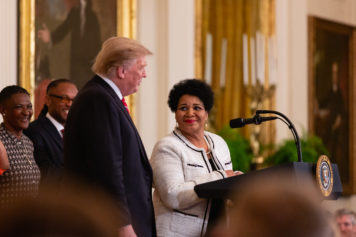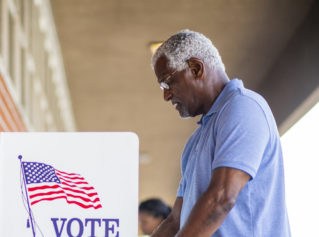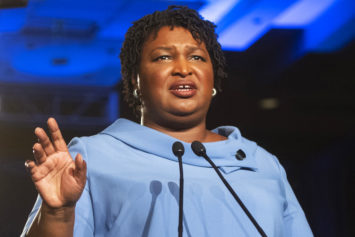The history of felon disenfranchisement in the U.S. pokes a massive hole in the theory that election laws are truly about protecting the political system in America and not about finding ways to weaken the power of the Black vote.
Laws that prohibit people convicted of crimes from voting have had a serious impact on the number of African Americans who were considered to have the right to vote —not because African-Americans were more likely to commit crimes but because they were more likely to be arrested.
With a justice system putting Black men behind bars at disproportionately high rates, felony disenfranchisement has always been a troubling topic in the Black community. The issue is thoroughly probed in a piece by Brent Staples in the New York Times that highlights the racism of felony disenfranchisement.
A closer look at the laws’ origins gives African-Americans even more reason to worry.
Today, nearly six million people with felony convictions were not allowed to vote in the latest midterm elections, Staples points out.
Those same laws barred one in every 13 Black resident in the U.S. from making their way to the polls.
According to the New York Times, that is four times the rate of nonblack citizens who are stripped of their right to vote.
According to a 2003 study by Angela Behrens, Chirstopher Uggen and Jeff Manza, state felony bans exponentially increased during the late 1860s and the early 1870s.
This was also the same time that the Fifteenth Amendment granted Blacks the right to vote.
As the 1890s rolled around, white supremacists opened up about why they were personally pushing for laws that would strip most felons of their right to vote.
According to the NY Times, one newspaper in South Carolina insisted that if voting laws were not amended, white people would lose their power in the political realm.
Less than a decade later, Alabama would amend its Constitution in order to add the term “moral turpitude” as a factor that could allow someone’s voting rights to be revoked.
The vague terminology meant that there was no way to monitor how exactly those voting rights should be revoked and it also meant that even some legal acts would serve as grounds to take away someone’s right to vote.
It was clear that the amendment would be aimed at Black citizens but the president of the constitutional convention insisted that it was in the best interest of the state because Blacks were considered to be inferior to whites.
Many states with high Black populations continued to adopt such laws while states with mostly white populations didn’t find it necessary to do so.
In fact, these states championed the rights of felons – felons that in these states were predominantly white men.
While other states used moral turpitude to strip African-Americans of their right to vote, these states argued that even murderers should be allowed to have a voice in political elections.
In Maine, officials refused to punish felons by taking away their right to vote even after families of the murder victims insisted it was the right thing to do.
According to families who lost loved ones at the hands of convicted murderers, if their loved one was stripped of the right to cast a vote, their murderer should be subjected to the same fate.
Officials’ opinions were unchanged by their pleas, according to Staples.
“Removing the right of some inmates to exercise their legal responsibility as voters in a civilized society would undermine that civilized society,” an editorial page of The Bangor Daily News said.
A former U.S. marshal and police chief added that “revoking inmate voting rights would strip imprisoned people of dignity and make rehabilitation that much more difficult,” according to the NY Times.
Those concerns didn’t seem to reach states with a higher population of Black residents.
Today, many states with felony disenfranchisement laws continue to have some of the highest percentages of Blacks who are unable to vote.
In Alabama, more than 7 percent of the state’s citizens are not allowed to vote based on disenfranchisement laws. For Blacks in Alabama, it’s 15 percent who can’t vote.
Meanwhile, countless efforts to reform disenfranchisement laws in states with predominantly Black residents have continued to fall on deaf ears.


